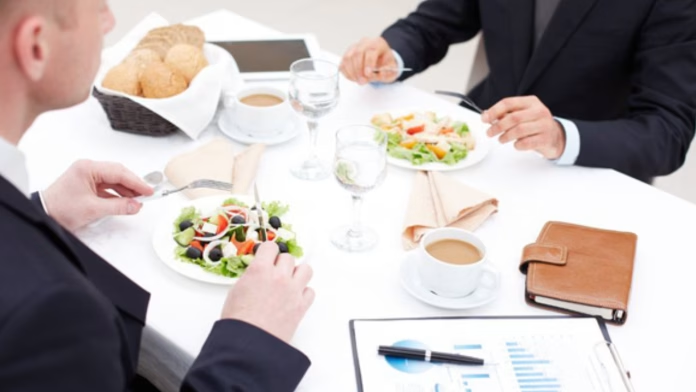Lunch etiquette is an essential aspect of professional behavior that often gets overlooked. In the workplace, it is essential to follow basic etiquette rules while having lunch with colleagues, clients, or business partners. These rules not only show respect and consideration towards others but also help create a positive impression in the workplace.
10 lunch etiquette rules that every professional should know:
Here are the 10 lunch etiquette rules that every professional should know.
- Arrive on time: One of the most basic etiquette rules for any professional is to arrive on time. If you have a scheduled lunch meeting, be sure to arrive a few minutes early to avoid keeping your colleagues or clients waiting. Arriving on time shows that you respect the other person’s time and are reliable.
- Dress appropriately: It is essential to dress appropriately for a lunch meeting, depending on the occasion and the people you are meeting. If you are meeting with clients or business partners, dress formally, and avoid wearing casual clothes like shorts or flip-flops. On the other hand, if you are meeting with colleagues for a casual lunch, it is acceptable to dress more casually.
- Be mindful of your table manners: Table manners are an essential aspect of lunch etiquette. Basic table manners like using utensils correctly, not talking with your mouth full, and keeping your elbows off the table are crucial to showing respect towards others. It is also important to wait for everyone to be served before starting to eat.
- Avoid discussing controversial topics: While having lunch with colleagues or clients, it is best to avoid discussing controversial topics like politics or religion. These topics can cause disagreements and create an uncomfortable situation. Instead, focus on discussing work-related topics or neutral subjects like current events or sports.
- Pay attention to your body language: Body language can convey a lot about a person’s personality and behavior. It is essential to maintain good posture and avoid slouching or crossing your arms. Maintain eye contact while speaking and avoid fidgeting or tapping your feet.
- Show interest in others: Showing interest in others is an important aspect of building professional relationships. Ask your colleagues or clients about their interests and hobbies, and listen actively to what they have to say. This shows that you value their opinion and care about building a strong relationship with them.
- Offer to pay: If you are having lunch with colleagues or clients, it is appropriate to offer to pay the bill. This gesture shows that you value their time and are willing to invest in the relationship. If your offer is declined, it is still essential to thank the other person for their time and consideration.
- Use your phone sparingly: While having lunch with colleagues or clients, it is best to avoid using your phone unless it is an emergency. Constantly checking your phone can be perceived as rude and disrespectful towards the other person. Instead, focus on engaging in a meaningful conversation with your lunch companions.
- Clean up after yourself: Once you have finished your meal, be sure to clean up after yourself. This includes putting your utensils and napkins in the correct place and disposing of any trash. Leaving a messy table can create a negative impression and show a lack of consideration toward others.
- Thank your companions: After the lunch meeting is over, be sure to thank your colleagues or clients for their time and consideration. Expressing gratitude shows that you value the relationship and appreciate the effort they put into meeting with you.
How these can help impress your office colleagues:
Following these lunch etiquettes can help create a positive impression on office colleagues and build strong professional relationships. Here is why:
- It shows respect and consideration towards others: Following lunch etiquette rules shows respect and consideration towards others. This can help create a positive and respectful workplace culture where everyone feels valued and appreciated. When colleagues see that you are mindful of their time, interests, and preferences, they are more likely to view you as a professional and trustworthy person.
- It demonstrates your professionalism: Following lunch etiquette rules demonstrates your professionalism and attention to detail. It shows that you take your role and responsibilities seriously and are committed to maintaining a high standard of behavior. When colleagues see that you are a professional, they are more likely to trust your judgment and expertise.
- It helps build stronger relationships: Building strong professional relationships is essential in any workplace. Following lunch, etiquette rules can help you build stronger relationships with your colleagues and clients by showing that you are interested in getting to know them on a personal level. This can help build trust, respect, and loyalty, which are essential elements of successful professional relationships.
- It can lead to more opportunities: Impressing your office colleagues can lead to more opportunities in your career. When your colleagues see that you are a professional and reliable person, they may be more likely to recommend you for new projects or opportunities. Building a strong professional network can also help you stay informed about new job openings or career advancements.
- It creates a positive workplace culture: Following lunch, etiquette rules can help create a positive workplace culture. When everyone in the workplace follows basic etiquette rules, it can create a more positive and harmonious work environment. This can help boost morale, reduce stress, and improve productivity.
Following lunch etiquette rules is an essential aspect of professional behavior that can help you impress your office colleagues. Basic rules like arriving on time, dressing appropriately, using good table manners, avoiding controversial topics, and showing interest in others can go a long way in building strong professional relationships. By following these rules, you can demonstrate your professionalism, build stronger relationships, and create a positive workplace culture.




